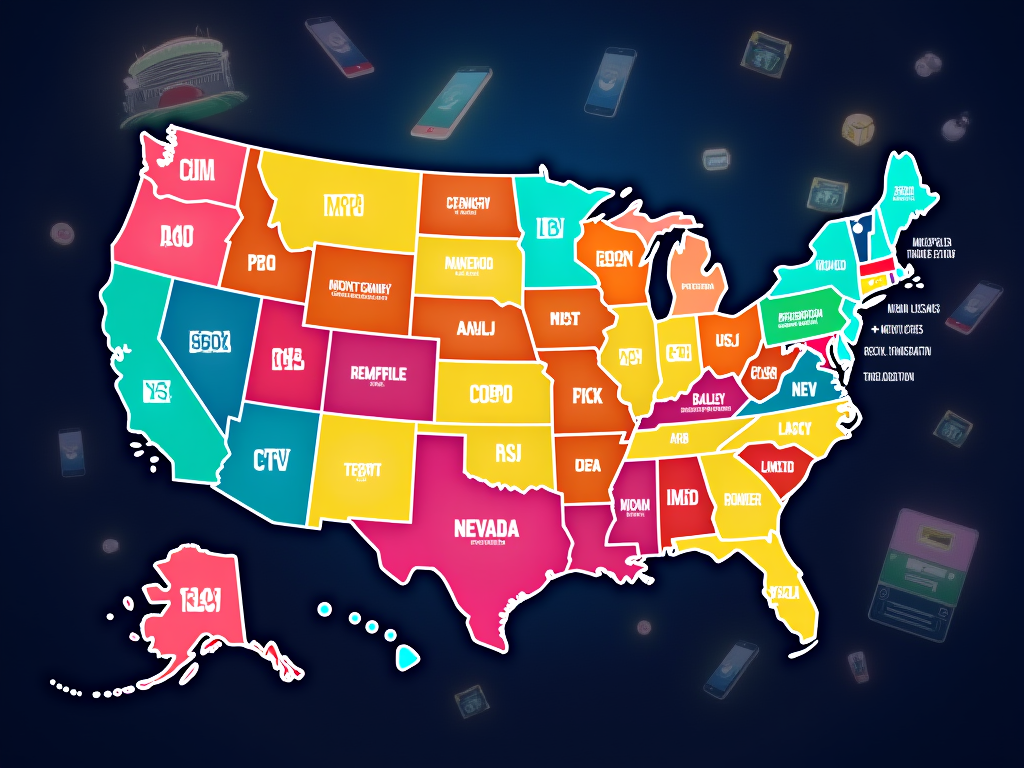Mobile Sports Betting: A Multi-Billion Dollar Industry on the Rise
Mobile sports betting has transformed the gambling landscape, reaching a staggering USD 60-70 billion in revenue during 2022 and 2023. Mobile platforms now dominate, accounting for 85% of U.S. online sports betting. With the rise of smartphones, user-friendly interfaces, and instant features such as live betting, wagering has become more accessible than ever for millions of people.
Key Takeaways
- Sports betting is projected to grow to USD 150 billion by 2030, increasing at a rate of 10-12% annually.
- FanDuel and DraftKings dominate the mobile sports betting market in the United States, controlling a combined 80% share.
- Males aged 25-44 represent 70-80% of active users, typically placing $10-50 bets.
- Betting apps boast high-end security, including geolocation tracking and bank-level encryption.
- Legal mobile betting is available in more than 30 U.S. states, each implementing unique rules and tax structures.
Smartphones Fuel Growth and Accessibility
The surge in popularity is largely driven by the convenience and ubiquity of smartphones. Mobile sports betting apps enable users to place wagers quickly and easily, often with options such as instant deposits and live in-game betting. This real-time interaction is particularly attractive to tech-savvy sports fans.
Secure, Regulated Platforms Build Trust
Modern betting apps incorporate advanced security features, including end-to-end encryption, user verification tools, and geolocation controls to comply with local laws. Because regulations vary by state, users must ensure that their location is authorized for legal betting. Compliance with strict rules helps build consumer trust and maintain responsible gambling environments.
User Demographics and Responsible Betting
The most active demographic is males between 25 and 44 years old, a group attracted to the combination of sports fandom and digital convenience. Most bettors place moderate sized bets ranging from $10 to $50, suggesting a trend towards responsible gambling behaviors.
The Future of Digital Wagering
With continued legislative support, growing user bases, and expanding digital capabilities, mobile sports betting is positioned as a powerful force in the future of online entertainment and gambling. As the industry continues scaling, it brings new opportunities and challenges for regulators, users, and tech providers alike.
For further insights, check out the following video:
https://www.youtube.com/watch?v=example
The Explosive Growth of Mobile Sports Betting in 2024
Mobile sports betting has transformed from a niche market into a powerhouse industry that’s reshaping how I place bets on my favorite sports. The global sports betting market hit an impressive USD 60-70 billion valuation in 2022/2023, with mobile betting leading the charge in this digital revolution.
Mobile’s Dominance in Sports Betting
The convenience of betting through smartphones has created a seismic shift in how bettors interact with sportsbooks. In U.S. markets, mobile betting now accounts for 70-85% of all online sports wagering activity, showing just how much we’ve embraced betting through mobile platforms.
This explosive growth didn’t happen by chance. The repeal of PASPA (Professional and Amateur Sports Protection Act) in 2018 opened the floodgates for legal sports betting across the United States. This landmark decision, combined with widespread smartphone adoption, created perfect conditions for mobile betting to thrive.
The industry’s trajectory points to even more substantial growth ahead. Financial projections suggest the market will expand at a compound annual growth rate (CAGR) of 10-12%, potentially reaching USD 150 billion by 2030. This growth is fueled by several key factors:
- Increased smartphone penetration across global markets
- Better mobile internet infrastructure
- Enhanced app security features
- User-friendly betting interfaces
- Integration of live streaming and real-time statistics
The rise of mobile betting has made sports wagering more accessible than ever. Whether you’re interested in traditional betting types or exploring prop bets, everything’s available at your fingertips. This accessibility has attracted a new generation of bettors who prefer the speed and convenience of mobile platforms over traditional betting methods.
The technological advancements in mobile betting apps have made them sophisticated yet simple to use. Features like instant deposits, quick withdrawals, and live betting options have become standard. For newcomers especially, these apps provide an excellent introduction to sports betting fundamentals, with built-in resources and tutorials.
The surge in mobile betting hasn’t just changed how we place bets — it’s revolutionized the entire sports viewing experience. Fans can now engage with their favorite sports in real-time, making informed betting decisions based on live action and instant statistics. This interconnected experience has created a more engaging and interactive way to enjoy sports, driving the industry’s remarkable growth even further.

Leading Betting Apps Transforming the Industry
Market Leaders Setting the Standard
The mobile sports betting landscape is dominated by two major players – FanDuel and DraftKings, who together control up to 80% of the US market. These apps have changed how I approach sports betting in the digital age, making it faster and more convenient than ever.
FanDuel’s Same Game Parlays feature has set a new benchmark for betting innovation, letting you combine multiple bets from the same game for higher potential payouts. DraftKings counters with its unique pools feature, creating tournament-style contests that add an extra layer of excitement to traditional sports wagering.
Competitive Benefits and Rewards
The top betting apps are competing fiercely for new users through attractive welcome bonuses and ongoing rewards:
- DraftKings offers a ‘Bet $5, Get $200’ bonus for new users
- FanDuel promotes its ‘No Sweat First Bet’ promotion
- BetMGM integrates with MGM Rewards for casino perks
- Caesars Rewards connects online betting to their extensive hospitality network
- ESPN BET brings trusted sports analysis alongside betting options
These apps have made significant strides in creating user-friendly interfaces that simplify common betting types. Each platform offers quick deposits and withdrawals, live betting options, and extensive sports coverage. The integration of loyalty programs, particularly through BetMGM and Caesars, adds value by connecting online betting activity to real-world rewards at hotels, restaurants, and entertainment venues.
While FanDuel and DraftKings lead the pack, BetMGM, Caesars, and ESPN BET have carved out their own niches through unique features and partnerships. These apps continue to push technological boundaries, offering enhanced live streaming capabilities, instant bet settlement, and personalized betting suggestions based on user preferences.

Who’s Betting and How They’re Doing It
The Core Sports Betting Audience
Men between 25-44 still dominate the sports betting landscape, making up about 70-80% of active bettors. I’ve noticed this demographic tends to be tech-savvy and passionate about sports, making them perfect candidates for mobile sports betting platforms.
The typical bettor places wagers between $10-50, showing that you don’t need deep pockets to join in. This betting range has helped create an accessible entry point for newcomers while allowing experienced bettors to manage their bankroll effectively.
Popular Sports and Betting Patterns
The NFL stands as the king of sports betting, followed closely by the NBA, MLB, and college sports. During peak seasons, many bettors place multiple wagers per week, with activity spiking around major events like the Super Bowl or March Madness. These peak times often see casual bettors trying their hand at prop bets and special wagers.
The sports betting landscape has seen notable shifts in recent years:
- Female participation has increased significantly, especially in mobile betting platforms
- Casual bettors are becoming more prevalent, often focusing on major sporting events
- In-play betting has gained popularity, with fans placing bets while watching games
- Fantasy sports players are converting to sports betting at high rates
- Mobile apps have made betting more accessible during commutes and lunch breaks
The rise of mobile betting platforms has changed how people engage with sports gambling. Instead of visiting physical sportsbooks, bettors can now place wagers from anywhere, leading to increased engagement during live games. This convenience factor has pulled in new demographics who might have found traditional betting outlets intimidating.
The casual bettor segment has grown substantially, particularly during major sporting events. These bettors might place a few bets per month, often on high-profile games or their favorite teams. They’re less likely to use advanced betting strategies and tend to stick with straightforward moneyline or spread bets.
This shifting landscape reflects broader changes in technology adoption and sports fandom. As mobile betting becomes more mainstream, I expect these demographic trends to continue evolving, with an increasingly diverse betting population emerging across age groups and genders.

Technology Powering the Mobile Betting Revolution
Security and Location Technology
Mobile sports betting depends heavily on location tracking to stay legal and secure. Before placing any bets, your device’s GPS and IP address get verified through geolocation services. This isn’t just a regulatory box to check — it’s essential for maintaining the integrity of legal sports betting in states where it’s permitted. I’ve seen how this tech creates digital boundaries that automatically block betting attempts when you cross state lines.
The apps protect your money and data through bank-level encryption standards. Every transaction, whether depositing funds or withdrawing winnings, gets processed through secure payment gateways. You’ll find familiar payment options like credit cards and PayPal, plus standard banking methods like ACH transfers for larger transactions.
Real-Time Features and Engagement
Live betting has transformed how fans interact with sports, and the technology behind it is impressive. During major events, in-play betting and props can make up half of all betting volume. The apps process massive amounts of data to update odds instantly as games unfold.
Here are the key features that make mobile betting apps so powerful:
- Cash Out options that let you secure profits or cut losses before a game ends
- Same Game Parlays combining multiple bets from one event
- Push notifications for game starts, score changes, and betting opportunities
- Live streaming integration on select events
- Stats and analysis tools updated in real-time
- Quick bet placement to catch fast-moving odds
The technology focuses on speed and reliability. When thousands of bettors try to place live bets simultaneously during big plays, the apps need to handle that traffic surge while keeping your experience smooth. This requires sophisticated load balancing and data management systems working behind the scenes.
The betting interface stays simple and intuitive despite the complex technology underneath. You can place bets with just a few taps, while the app handles all the heavy lifting of odds calculations, bet settlement, and account management automatically.
The State-by-State Betting Landscape
The sports betting landscape in America has changed dramatically since 2018, with over 30 states plus Washington DC now offering legal mobile betting options. This rapid expansion has created a patchwork of different betting regulations across states.
Leading Mobile Betting Markets
Each state takes its own approach to regulating mobile sports betting platforms. New Jersey stands out as a pioneer, adopting an open-market system that lets multiple operators compete. This competitive environment has sparked innovation and better odds for bettors.
By contrast, New York implements a restricted licensing system with higher tax rates on operators. While this generates substantial tax revenue for the state, it can impact the promotions and odds available to bettors. Despite these limitations, New York has quickly become one of the highest-volume betting markets in the country.
Here’s what you’ll find in the major betting states:
- New Jersey: Open licensing system, competitive market with 20+ betting apps
- Pennsylvania: Balanced approach with moderate tax rates and licensing fees
- New York: Limited licenses, highest operator tax rate at 51%
- Nevada: Traditional model requiring in-person registration
- Illinois: Large market with initial in-person registration requirement now lifted
The tax structures and licensing fees vary significantly between states. Pennsylvania charges operators a $10 million licensing fee, while other states set different barriers to entry. These regulations directly affect which betting companies operate in each market and what promotions they can offer customers.
Some states restrict certain types of wagers, particularly on college sports. For example, some jurisdictions don’t allow betting on in-state college teams, while others prohibit specific prop bets on college athletes.
The mobile betting expansion continues with several states working on legislation. The success of established markets like New Jersey and Pennsylvania serves as a blueprint for newer states entering the space. Each state must balance revenue potential, consumer protection, and market accessibility when crafting their regulations.
I’ve noticed that states with more open markets and reasonable tax rates tend to provide better value for bettors through competitive odds and promotions. However, even in highly regulated markets, mobile betting apps have transformed how people engage with sports wagering.

Responsible Gaming and Risk Management
Essential Control Features
Mobile betting apps put powerful safeguards right at your fingertips to help maintain control of your betting activities. I’ve found that setting clear boundaries through built-in tools creates a safer, more sustainable betting experience. These crucial features help you make informed decisions about sports betting.
Here are the key responsible gaming tools available in most betting apps:
- Deposit Limits – Set daily, weekly, or monthly caps on how much money you can add to your account
- Wagering Limits – Control the maximum amount you can bet within specific timeframes
- Time Limits – Restrict the hours you can access the app
- Cool-Off Periods – Temporarily suspend your account for a short break
- Self-Exclusion – Block access to your account for extended periods
Advanced Protection Systems
Modern betting apps now integrate sophisticated AI systems to spot potential problem gambling patterns. These systems track betting behaviors and can trigger automated interventions when concerning patterns emerge. I’ve noticed how responsible betting practices have become central to the mobile gaming experience.
The rise of mobile betting has led to increased calls to gambling helplines. The National Problem Gambling Helpline (1-800-GAMBLER) provides 24/7 support, connecting you with trained professionals who can offer guidance and resources. They’ve seen a significant uptick in mobile-related inquiries, showing the importance of having strong support systems in place.
The convenience of mobile betting makes it extra important to stick to a clear betting strategy and budget. I recommend setting up these protective tools before you start placing bets. Think of them as your personal guardrails – they’re there to keep your betting fun and within your means.
Taking regular breaks from betting helps maintain perspective and prevents emotional decisions. The cool-off period feature is particularly useful after a losing streak or when you feel your betting might be getting out of hand. It’s a simple yet effective way to step back and reassess your betting habits.
Remember, if you’re struggling with gambling-related issues, reaching out for help isn’t a sign of weakness – it’s a smart move toward regaining control. The helpline operators understand the unique challenges of mobile betting and can provide specific strategies to manage your gaming activity.

Sources:
American Gaming Association – State of the States
EiGaming – Industry reports
National Council on Problem Gambling
Grand View Research
Statista
Legal Sports Report
Pew Research Center





